


Tropical Apricot Berries
Estimated Inventory, bskt : 0
Description/Taste
Tropical Apricots are small fruits, measuring around 2.5 centimeters in diameter. They have a thin skin that matures from a pale green to an orange-red with a velvety texture. The skin is dotted with pale spots and has a distinguishable green calyx at the stem, a remnant of the flower. The flesh is a pale orange color and contains several small seeds. It has a soft texture and a melting quality. Tropical Apricots have a flavor reminiscent of an apricot but are sour and astringent and are often cooked with a 1:1 ratio of sugar to reduce the acidity.
Seasons/Availability
Tropical Apricots are available year-round with peak seasons in the spring and fall months.
Current Facts
There are two fruits commonly referred to as the “Tropical Apricot”. One is native to Africa and Southeast Asia, the other is a hybrid of that same fruit and another from the same genus. Botanically, the fruit is Dovyalis abyssinica, also known as the Abyssinian gooseberry, or a naturally occurring hybrid of Dovyalis abyssinica and the Ceylon gooseberry, Dovyalis hebecarpa. Both have a similar appearance and differ slightly in the levels of acidity in the flesh. Tropical Apricot trees can produce up to 100 pounds of fruit in a year. They grow on large, leafy trees with extremely long, sharp spikes, which make harvesting a challenge.
Nutritional Value
There has been no true nutritive study on Tropical Apricots, however, there has been studies done on the Ceylon gooseberry. They are rich in vitamin C and are a good source of dietary fiber, phosphorus and iron. They also contain small amounts of B-complex vitamins.
Applications
Tropical Apricots can be used raw or cooked. Raw fruits can be peeled and combined with other fruits for chutneys or eaten as a whole fruit. They are most commonly used to make jelly and jams, sauces and juices, and are combined with other tropical fruits. The juice can be used in desserts and to make ice cream or sorbets, or used in marinades, dressings or for wine making. The pulp can be juiced several times to change its consistency. Tropical Apricots must be refrigerated as soon as possible, as they are highly perishable. Once refrigerated, they will keep for up to three weeks if undamaged.
Ethnic/Cultural Info
The hard wood of the Tropical Apricot tree is considered a valuable commercial wood source used for making tool handles, bedframes and spoons. Roots and stems of the tree were traditionally used to make a tonic soup for health.
Geography/History
Tropical Apricots are native to Africa, whereas the hybrid variety is native to Florida. Dovyalis abyssinica is native to the eastern African countries of Ethiopia, Kenya, South Sudan, Somalia, Tanzania, Uganda Eritrea and across the Gulf of Aden in Yemen. They are most often eaten by locals and are sometimes found in markets in the region. The hybrid fruits were first discovered in 1953 and were a cross between D. abyssinica and the Ceylon gooseberry, a dark purple-skinned fruit with similar characteristics and musky, sweet flesh. The hybrid fruits can be found in Florida, Cuba and Hawaii, and to a very limited extent in Southern California. They are likely to be spotted at local markets and fruit stands.




